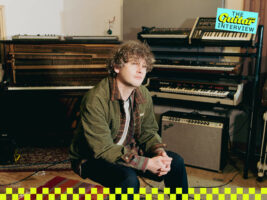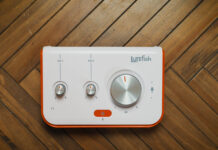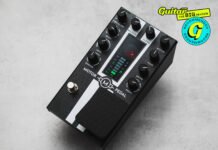
“I knew I had something special”: Bill Ryder-Jones on how he made one of 2024’s most captivating records
Bill Ryder-Jones ruffles his tangle of hair and looks to the ceiling of his living room for a couple of seconds. It’s mid-morning on a Friday and, not for the first time, he is reflecting on why, exactly, he becomes fixated on his past work while assembling a new project. “I’m definitely not the only artist who’s ever been trying to better a record, thinking they hadn’t yet,” he observes over Zoom. “It’s a very personal thing.”
READ MORE: How Magnolia Park become pop-punk’s new hellraisers
In Ryder-Jones’ case, the long shadow is cast by 2013’s A Bad Wind Blows in My Heart, the second solo LP he released after leaving his role as lead guitarist with Liverpudlian psych-pop greats the Coral five years earlier.
A decade later, he has a record by his side that he considers a suitable response. The recently unveiled Iechyd Da (a traditional Welsh toast meaning ‘good health’) is a melodically rich, entirely beautiful collection of songs that does everything you’d want a Bill Ryder-Jones record to do – it’s by someone who understands who they are.
“I was with [the Coral’s] James Skelly last night, we had a couple of pints,” he continues. “I was saying that I think Magic and Medicine is one of the greatest albums of all time. His writing at that point was fucking phenomenal. But he sees that as him being quite young and naive so, therefore, he isn’t really interested in bettering it, just what’s next.
“Whereas, for me, I feel like Yawn and West Kirby County Primary, despite loving them and having a great time making them, didn’t come close to A Bad Wind Blows In My Heart. It’s been on my mind for a long time. I didn’t know how to better it until I realised that I’m a pretty fucking good producer now. I can probably do something like that having learned more about the craft.”
Bill Ryder-Jones. Image: Marieke Macklon
Production Hub
From that perspective, Iechyd Da is fascinating. Ryder-Jones has observed that it is his ‘most produced’ record, but that doesn’t translate into the bells and whistles the phrasing immediately suggests. Instead, he spent three years focusing on construction and atmosphere, foregrounding the sense of intimacy that his lyrics – on death, heartbreak, childhood – required. “It’s like Simon & Garfunkel,” he says. “There’s the songs, and there’s how they’re dressed. That’s it, you know? I think that’s how I have to picture it. My voice and my guitar or piano are there, and then I have all this room to play with.”
The first four tracks were written in a week that felt like a headrush. “They just came,” Ryder-Jones says. “That doesn’t always happen.” A foot in the door, he had time to pause and reflect almost immediately, searching not only for more material but for the right material. “It got to that beautiful point where I knew I had something special,” he recalls. “I could sit back and go, ‘Okay, I’ve said what I want to say in those songs, now I can think of what the album needs.’”
Iechyd Da is a beautiful record – funny, sad, sun-dappled, endlessly melodic – but its ace is the sense of live-in-the-room veracity it achieves despite being a dyed-in-the-wool studio record. Discussing its creation, Ryder-Jones references watching footage of Brian Wilson getting into the weeds while making Pet Sounds, noting that he wanted to keep that human element alive while poring over each and every move.
Image: Marieke Macklon
Ryder-Jones’s studio – reflecting that self-referential bent, it’s called Yawn and it’s in West Kirby – is an interesting character in the record. “It’s quite small,” Ryder-Jones says. “You can do drums, bass, guitar, and maybe a guide vocal, together but that’s pushing it a bit. We have a 16-channel desk and only 14 work.” It’s not big enough for him to go full Pet Sounds, then, but it offers limitations that someone willing to work with them might turn into creative spurs. The first song, I Know That It’s Like This (Baby), is an interesting case study when it comes to this approach, its elements falling into place as a sample of Gal Costa’s Baby ebbs and fades.
“I remember the whole point of that recording was to make one of those cool intros, like Walk on the Wild Side, Sunday Morning,” he recalls. “I wasn’t sure why it wasn’t sounding cool because all the elements that I’d stolen from other records were cool. It was dead simple – it just didn’t sound like it was all happening at once. So, when I was doing all the bass I put a microphone underneath the snare and recorded the bass DI, the amp and the snare. When you’re playing with a band, the kit rattles. These little things, they add up. I find that stuff to be the glue.”
Nylon Nights
Ryder-Jones is clearly of the belief that he can go anywhere he wants with 14 channels, stitching DIY solutions such as this one to disco samples and childrens’ choirs in Iechyd Da’s patchwork, searching for a feeling or mood. While working on the record he was listening to a lot of hip-hop and there are parallels with something like Wu-Tang Clan’s Enter the Wu-Tang (36 Chambers), where RZA built a dense, multifaceted world using little more than nous, personality and a sampler.
“That is production by someone who inherently knows how music should sit together,” Ryder-Jones says. “What I find interesting about hip-hop, and RZA in particular, is that everything’s a hook. Every time you hear something, it’s there for a reason. Space has been made for it. The words are so loud and it’s very crunchy, but it’s got this space to it. It feels alive. It feels like you’re at a party but it also sounds fucking amazing on headphones.”
His use of guitars on Iechyd Da should be viewed through this prism. They are chiefly a textural element – the glue that Ryder-Jones is looking for, bobbing in the wake of a harmonium or ringing out to let a whispered vocal hang in the air. You can hear fingers moving over nylon strings, plectrums adding tiny percussive notes, each apparently extraneous sound coalescing into a feeling of personality.
Image: Marieke Macklon
“The nylons can do very different things,” Ryder-Jones says, noting that he writes at home on a well-loved pre-war Martin 0-17, likely a 1936. “It’s not bright at all, it has this numbness to it that I find really pleasing,” he observes. The guitar on the record, meanwhile, is a very unique instrument – a John Le Voi from 1989. “It’s a fucking gorgeous guitar,” he adds. “I bought it off eBay in 2003, something like that. It was cheap, £200-300. It turns out this guy who made it has got this reputation as a luthier.”
Using the nylons as a base colour means that even a subtle change-up reaps rewards. When It’s Today Again lopes into view two thirds of the way through the record, its steel strings immediately pop, with zero extra effort. It’s just not what you’ve become used to. “I love that stuff,” Ryder-Jones says. “Gorky’s Zygotic Mynci are my favourite band, and there’s one record of theirs that has this really quiet high-pitched frequency going through the first track. You haven’t noticed it come in, but when it stops and the next song starts you’re like, ‘What the fuck’s just happened there?’”
The electric flourishes are equally unobtrusive, adding honeyed jangle to the chorus of I Hold Something In My Hand or ballast to Nothing to Be Done. “My main electric is a 60s 335,” Ryder-Jones says. “It was the first thing I bought when the Coral got our advance. It cost like £3,000 in the year 2000, you know? It was a big fucking deal.” There’s a brief pause as he reaches into his brain to remember a little slice of rock history. “I’ll tell you what I did use,” he says. “I’ve got one of Peter Green’s Les Pauls. It’s not one of his Goldtops – it’s from the 80s. It does dull really well. It’s a heavy fucking beast of a thing.”
At one point, searching for a song title, Ryder-Jones wanders out of frame and returns with a vinyl copy of Iechyd Da, flipping it over to view the tracklist. Nothing says ‘move on’ quite like holding the physical evidence of your work in your hands but, true to form, he is already revisiting it in his mind. “I’ve got to be honest, making that record was the most thrilling high, and it lasted for fucking ages,” he admits.
But there is something else, a sense that by finally standing up to A Bad Wind Blows in My Heart, he’s found one answer and while uncovering a bunch of different questions. “I feel like, maybe, I’m ready to start doing other things that stand outside of my songwriting schtick, you know?” he says. “Maybe it’s time I actually stop writing about myself for a bit. But I don’t know how that affects what comes next. I like how jokes are written. It’s setup, misdirection, misdirection, punchline. You can look at a career like that.”
Bill Ryder-Jones’ ‘Iechyd Da’ is out now on Domino.
The post “I knew I had something special”: Bill Ryder-Jones on how he made one of 2024’s most captivating records appeared first on Guitar.com | All Things Guitar.
Source: www.guitar-bass.net












